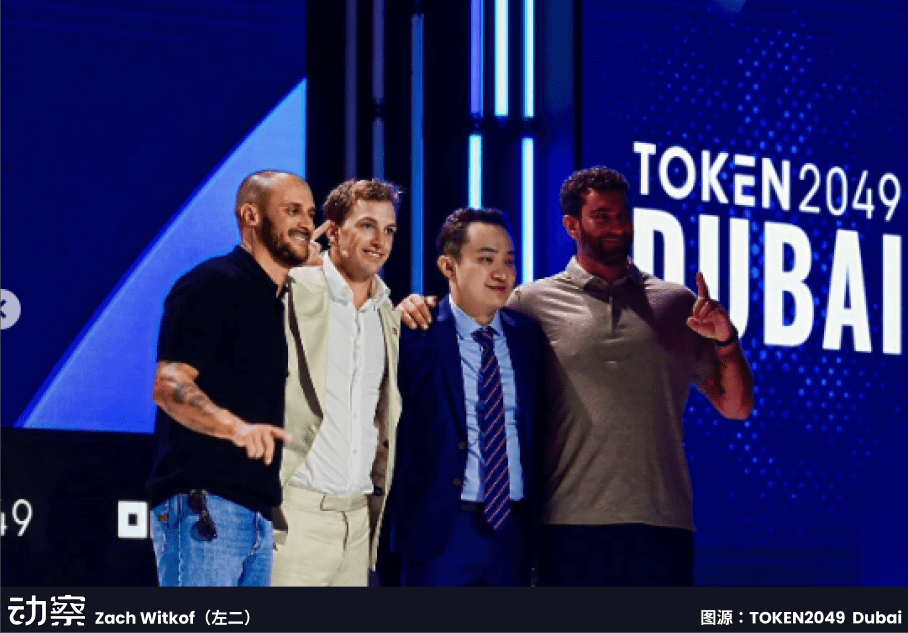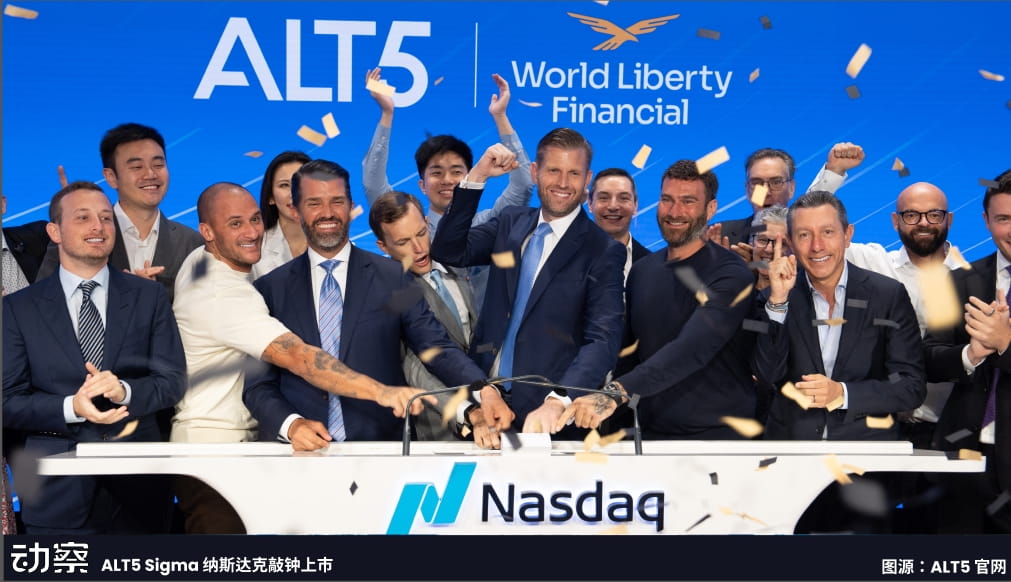In August, among the announcements at Nasdaq, there was a seemingly ordinary financing that exploded like a hidden thunder: ALT5 Sigma issued up to 200 million shares of common stock at $7.50 per share (approximately 10 billion RMB), exchanging shares for WLFI tokens, and sending Trump's youngest son Eric Trump into the board.
Overnight, this fintech company ALT5, which had annual revenues of only $20 million, transformed into 'the listed vault of the Trump family.' ALT5 is not just raising funds; it is brazenly pushing the politically stamped stablecoin WLFI and its issued USD1 into the U.S. securities system.
WLFI (World Liberty Financial) is not just a simple startup, but a 'political mint' crafted by the Trump family.
This company was founded two months before the U.S. elections, and in just a few months, WLFI has already brought hundreds of millions of dollars in revenue to the family business through the stablecoin USD1. In other words, what ALT5 has connected is not just a stablecoin, but a whole set of political financial weapons.
The question is — is ALT5 really raising funds, or selling a wealth ticket inscribed with 'political dividends'?
1. The secret lineage of ALT5: The intersection of three forces.
A company's shareholder list often reveals more than financial reports.
The shareholder structure of ALT5 is almost a power puzzle: offshore capital, Wall Street funds, and political token factions intertwine, making this company look like both a fintech enterprise and a political financial experiment.
What truly gives ALT5 a gunpowder flavor are these types of shareholders: political token factions. The representative figures are two: Zach Witkoff and Eric Trump.
Eric Trump needs no introduction — the son of President Trump, currently overseeing the family's crypto industry, directly entering the ALT5 board.
What deserves special mention is Zach Witkoff — the co-founder of the WLFI stablecoin and currently serving as the chairman of ALT5.
Looking solely at his resume, Zach Witkoff's background has already determined he would not be an ordinary entrepreneur. He is the son of Steven Witkoff, a well-known real estate developer in New York, who currently serves as the U.S. special envoy for Middle East issues. The Witkoff family has decades of accumulation in Manhattan's real estate sector, having held numerous landmark buildings, and his father Steven has dealt with New York's finance and political circles for many years.
The Trump family's origins are in real estate, and Steven Witkoff has long had close ties with the Trump father and son in the New York real estate circle.
The relationship between Zach and the Trump family can be summarized in one sentence: real estate connections + political ties. Therefore, the relationship between Zach and Eric is not merely 'cooperation' but a familial political financial alliance.

If Eric Trump puts the family's political resources on the table, then Zach Witkoff is the one executing the financial grounding for the Trump family. He is a key bridge figure in this political-financial entanglement.
Thus, the existence of these two individuals means that ALT5's development path will increasingly become politicized. It is not just pursuing commercial expansion but is preparing financial tools for the U.S. political cycle from 2025 to 2028. To some extent, it is part of the Trump family's 'financial arsenal.'
Next, let's take a look at one of ALT5's major shareholders, an offshore company registered in the Bahamas — Clover Crest Bahamas Ltd., holding approximately 11%. The Bahamas is well-known as a tax haven, with many wealthy individuals and companies registering there. The reason is simple: it enjoys lenient tax policies while avoiding excessive regulatory scrutiny.
To put it simply, Clover Crest is like a dark channel for the Trump family, able to quietly send money to ALT5 and isolate risks when needed.
Another force of shareholders comes from Wall Street fund companies, such as the well-known Vanguard Group. Such funds have the potential for global retail investors to indirectly hold them, as they operate large-scale index funds.
Vanguard's stake in ALT5 is not high and appears to be a passive allocation. However, the issue is: when the public sees a name like 'Vanguard Group' on the shareholder list, they instinctively feel this company is 'legitimate' and 'reliable.' This is what is known as legitimacy endorsement.
These three forces each have different logics: offshore financiers provide obscure funding channels to ensure money can flow in; Wall Street funds provide facade and legitimacy to ensure the company appears 'compliant and legitimate'; political token factions provide narrative and strategic direction, pushing ALT5 onto the global stablecoin stage.
The combination of the three makes ALT5 both clean and dangerous.
On the surface, it is a rule-abiding financial technology company; in reality, it is being used as a stablecoin version of 'Trojan horse,' quietly carrying political and capital ambitions under a compliant facade.
2. The FinTech facade — where does the compliant hidden door lead?
On paper, ALT5 is a perfectly normal fintech company. It holds complete licenses, offering a full set of services including payment gateways, OTC trading, custodianship, and white-label exchanges, with annual revenues of about $20 million and a gross profit close to 50%, making it a top performer in the crypto payment industry. Compliant, transparent, with impressive data, it even appears 'cleaner' than many traditional payment companies.
But what truly propelled ALT5 from a niche tool-based FinTech to a global focus was the $1.5 billion financing in August 2025. Overnight, it transformed from merely an API company to a new position — becoming the 'Nasdaq vault' for Trump's stablecoin WLFI.
This means that ALT5 is no longer just a technology-selling factory but has become a key node in the globalization of stablecoins.
Why is it called a 'backdoor'? The reasoning is quite simple.
First is the protection of surface identity. If the WLFI stablecoin wants to directly enter payment networks in various countries, it will almost certainly hit the high walls of central banks and regulations. However, ALT5 has ready-made fintech licenses, allowing it to take the lead as a 'payment API service provider.' Regulators see a compliant FinTech, not a politically charged stablecoin.
Secondly, there is the secret channel for cross-border settlement. The ALT5 Pay API allows merchants to accept cryptocurrencies like BTC and USDT, which are automatically converted into dollars or euros in the background. If WLFI/USD1 is embedded, merchants and users may not even realize they are using a stablecoin backed by the Trump family. On the surface, it's 'payment technology,' but it effectively achieves the penetration of stablecoins.
Finally, there is the natural integration of a global network. ALT5 has connected the Lightning Network and stablecoin payment systems, achieving efficiency far superior to traditional cross-border payments relying on SWIFT. For many emerging markets with a strong demand for dollars but lacking direct access to Wall Street, ALT5 provides an invisible express lane. Through it, WLFI can quickly 'sink' into global trading scenarios with very low resistance.

In this way, the significance of that $1.5 billion financing becomes clear: it is not just simple expansion capital, but more like a strategic deployment to lay the global payment pipeline for WLFI.
ALT5 can naturally continue to assure regulators, 'We are just a compliant API payment company.' But in the shadows, its interfaces may be becoming the track for stablecoins to bypass the traditional financial system.
This dual narrative makes ALT5 a typical 'fintech facade.' Externally, it appears clean, transparent, and professional, a textbook FinTech; internally, it is being pushed to a strategic height, becoming an indispensable piece in the puzzle of stablecoin globalization.
This may be the key reason why WLFI can quickly transition from a political concept to a real financial tool: it has found a 'legitimate backdoor' like ALT5.
When the compliant facade is thick enough, stablecoins can quietly flow into merchants' and users' daily transactions, and by the time regulators truly react, that door may have already been wide open.
3. Trump's shadow financial empire.
ALT5 is just the tip of the iceberg; the larger landscape underneath is the Trump family's effort to create their own dollar system.
……
For the complete content, please go to 【动察 Beating】 public account to read.


